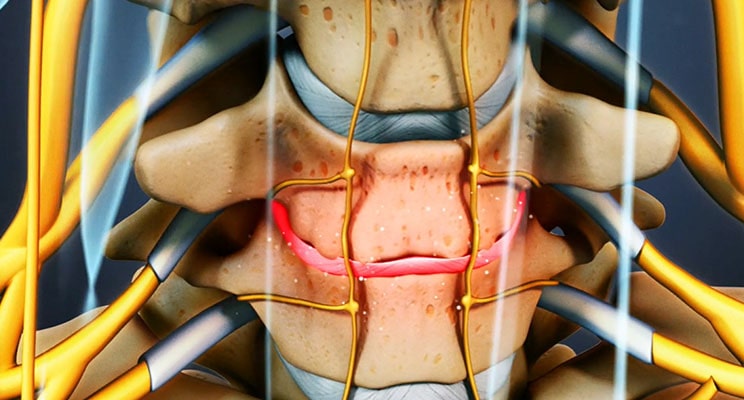
Many people encounter problems in their spine because of the degeneration of the inverted discs. Degenerative disc disease is an age-related condition when the discs present between the vertebrae of the spinal cord break down or deteriorate and often cause pain.
The rubbery discs between the vertebrae allow the flexibility and bending of the back area and shock absorbers. This condition involves the intervertebral or spinal discs. Degenerative disc disease is not really a disease, but it is normal wear and tear condition caused due to aging in the spine. The discs are located in between the vertebrae of the spine and act as cushions and shock absorbers.
A degenerative disc disease problem occurs within one or more of the intervertebral discs. The disc is present between each of the vertebrae in the spinal cord. The discs act as shock absorbers, and without the cushion effect of the discs, the vertebrae in the spine cannot absorb the stresses. The stress is transferred to the discs, and it causes injuries to the disc.
The spinal discs provide padding between the vertebrae of the spine. The outer part of the disc is called annulus fibrosus, and its outer portion contains nerves. Any damage to this layer can cause disc tears that are quite painful. The inner core of the disc is called nucleus pulposus and is soft and gelatinous.
Consult today with the Best doctor for Cervical Spine Surgery in India.
This part contains protein, and if this protein leaks out to the nerves of the outer layer of the disc, then it can cause a great deal of pain. Increasing age can also cause the discs to lose its flexibility, elasticity, and also the shock-absorbing characteristics. They also become thinner and dehydrated and become stiff and rigid that restricts body movement and causes pain.
The disc has a low blood supply, and if any injury occurs, the disc cannot repair itself. This causes acute pain and makes the normal movement of the back area of the body difficult. The affected bone becomes relatively unstable, and the patient will experience back pain that comes and goes. The patient also suffers from fever bouts when the body restabilizes the injured bone segment. If one has chronic neck and back pain, they might have degenerative disc disease. This condition mostly affects the low back (lumbar spine) or neck (cervical spine).
The doctor will ask for symptoms, pain, location, numbness, and actions that make the pain severe. They will also inquire about any accident, injury, or falls.
Physical test
Imaging and other diagnostic tests
If the degenerative disc disease does not respond well to non-surgical treatment, then surgery is performed.
In artificial disc replacement, the broken disc is replaced with a new disc made up of plastic and metal. The spinal fusion treatment helps connect vertebrae and helps to strengthen the area.
Book an appointment with an expert Degenerative Disc Disease Specialist in India!
The cost of degenerative is disease surgery for minor surgery is between Rs.2 lakhs to 4 lakhs. It can cost between Rs. 4 lakhs to 7 lakhs for complicated surgeries that involve fusion or vertebral body removal. For more information about cost, consult today with a degenerative disc corrective doctor in Delhi.
Dr. Arun Saroha, the best degenerative disc replacement surgeon in India, provides the best suitable treatment to effectively cure the condition. With more than 25+ years of experience, he provides the best treatment to cure the degeneration of the inverted discs. He has performed more than 6,000+ successful surgeries for brain and spinal problems. His surgical skills and using cutting-edge technology help him deliver the patients with excellent outcomes and bring more patients from around the world.
Patient ABC
Thank you, doctor, for the treatment. Very humble person and provides the best treatment.
Degenerative disc disease is not curable by itself. Several degenerative disc disease therapies aim to alleviate symptoms. Some may have symptoms that are more intense or last longer than others..
Injury, health and lifestyle factors, and possibly a genetic predisposition to joint pain or musculoskeletal disorders may all contribute to spinal cord degradation, which can be compounded by injury, health and lifestyle factors, and possibly a genetic predisposition to joint pain or musculoskeletal disorders. Significant trauma, such as a car crash, is rarely the cause of degenerative disc disease.
Degenerative Disc Disease, or DDD, is one of the most common diseases for which the Social Security Administration (SSA) receives disability applications. While this is a qualified disability in some circumstances, proving that your condition meets SSA duration and severity level requirements can be difficult.
"Drinking lots of water is very important for everyone, but especially if you have degenerative disc disease," by staying hydrated there are other ways to maintain the amount of water in your spine than in other ways.
Dr. Arun Saroha ©2020 All Rights Reserved By Branding Pioneers.